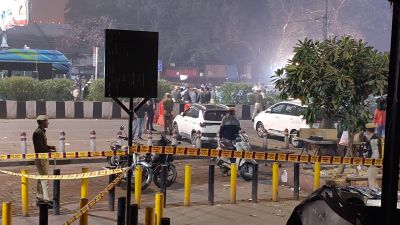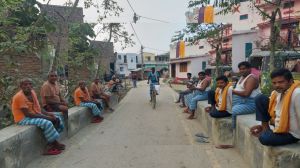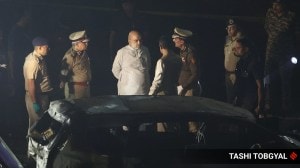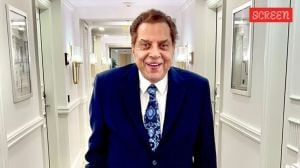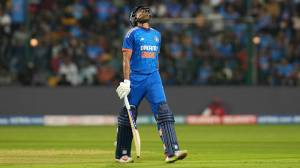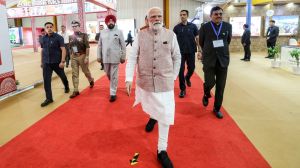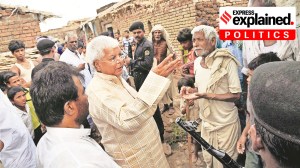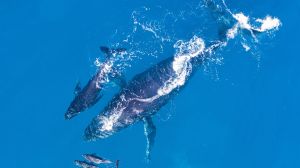Shubhajit Roy, Diplomatic Editor at The Indian Express, has been a journalist for more than 25 years now. Roy joined The Indian Express in October 2003 and has been reporting on foreign affairs for more than 17 years now. Based in Delhi, he has also led the National government and political bureau at The Indian Express in Delhi — a team of reporters who cover the national government and politics for the newspaper. He has got the Ramnath Goenka Journalism award for Excellence in Journalism ‘2016. He got this award for his coverage of the Holey Bakery attack in Dhaka and its aftermath. He also got the IIMCAA Award for the Journalist of the Year, 2022, (Jury’s special mention) for his coverage of the fall of Kabul in August 2021 — he was one of the few Indian journalists in Kabul and the only mainstream newspaper to have covered the Taliban’s capture of power in mid-August, 2021. ... Read More
Trump resetting transatlantic ties: Europe’s response, India’s role
Benedikt Franke, Vice-Chairman of the Munich Security Conference, where JD Vance made the speech that was seen as a turning point in the America-Europe alliance, spoke to Shubhajit Roy about the emerging global order, and the role India could play.
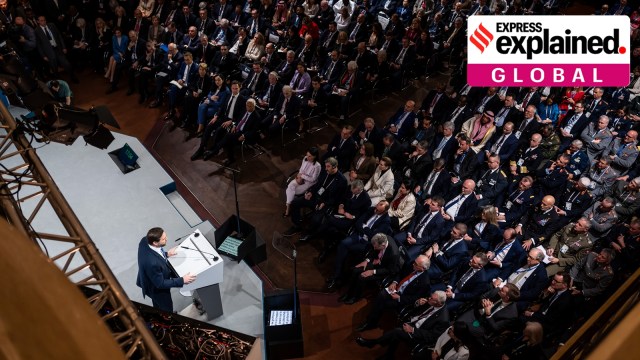 US Vice President J D Vance speaks at the Munich Security Conference. (Image source: MSC)
US Vice President J D Vance speaks at the Munich Security Conference. (Image source: MSC)Europe-US ties: The February 14 speech by United States Vice President J D Vance at the Munich Security Conference (MSC) stunned Europe and put the transatlantic partnership under unprecedented stress. But it also carried important lessons for Europe — and for the world.
What was your reaction to Vice President J D Vance’s speech attacking Europe ?
Benedikt Franke: We had expected his speech to be disruptive, but we expected a different kind of disruption. We were expecting something along the lines of the US withdrawing troops from Europe or doing something similarly policy-based. The fact that he went for our common values took virtually everyone by surprise.
But I keep telling people that if you judge a speech by whether it achieves its intended outcome, then this was a very good speech, because it freaked out the Europeans and it bolted them into action.
You’ve seen a couple of emergency meetings since then, emergency legislation, and it has really, really, really achieved its intended purpose, to get Europeans to do more for their own security.
The problem is whether it has destroyed some of the trust that was the bedrock of the transatlantic relationship in the meantime.
So, have we seen a lot of good, but at the same time even more bad, and that balances it out — the jury is still out
President Donald Trump has asked Europe to do more, and he is seen as a transactional leader. Should Europe do more?
Benedikt Franke: I think it is absolutely true that Europe needs to do more for its own defence, and it has been true for the last six decades. I think President Trump has a very good point in increasing pressure on Europeans to do the right thing.
[But] We shouldn’t do it for President Trump’s sake. We should not do it to make him feel good. We should increase our own efforts because it’s the right thing to do in a world that has become more unstable and where we cannot rely on outsiders. Europe needs to get its act together for its own sake.
Turning transactionalism into a kind of negative word is something we should not do. Transactionalism isn’t okay because it rewards those with the better ideas and the better offers. It just is the case that European offers haven’t been so good in the last decades, and we need to work on making them attractive again, including to countries like India.
At the MSC in 2007, Russian President Vladimir Putin had warned against a unipolar world order. Do you think Europe and the world didn’t take him seriously?
Benedikt Franke: Yes, and I think we should really look back at that moment and always ask ourselves, whom else are we losing? Have we lost China, for example. Are we making the same mistake we made with Putin, not believing his words and not taking his worries seriously? Whether we find him legitimate or not is a different thing, but you need to take the worries of people like Putin and of countries like Russia seriously, and if you don’t, do you have to live with the results?
Having said this, nothing excuses the atrocities that we’ve seen in Ukraine, in Bucha, and in other places. So while I totally buy the argument that at some point the Europeans lost Putin, and while I buy the argument that we could have and should have done much more to keep him and Russia involved in the European system, nothing that we have done justifies what he has done.
How do you see India’s role in this world of turmoil? Do you think it can play the role of a peacemaker, or is it beyond its capacity?
Benedikt Franke: It’s certainly not beyond its capacity. India is becoming an ever more important actor, and…we’ve seen an interesting dynamic in the conversation.
You remember when the war in Ukraine started, we Europeans were disappointed by India not stopping energy imports. We didn’t quite get it, we were so often talking about the same values. But when those values were threatened, we and you retreated to the affordability of energy and the need for you to develop your country.
I think we, Europeans, have come a long way. We have now understood why you have done what you’ve done. We have understood that your key priority needs to be the development of India, the reduction of poverty, and that you do need Russia for that.
I think what we are hoping is that you are going to use your relationship that is good, both with Russia and with Europe, to become more of an intermediary. We need you to help us broker peace.
And it is fair to say that India can still do more than it is currently doing. I mean, where is the Indian initiative? We’ve seen a Chinese initiative two years ago, now we are seeing the US initiative. But where is India’s leadership?
I think it would be a natural, born leader in this space, and not just in this space. India could do so much to help us reform multilateral institutions. It could do so much to help us improve the international financial architecture. And I have the feeling that there is a lot of noise coming from India, but where are the actual initiatives?
I think we saw the G20 Summit, which was a successful G20 Summit. We saw the African Union becoming a part of the G20 at the suggestion of Prime Minister [Narendra] Modi. So there are things that you are getting right from a German and a European perspective. We would love to see more of it. And Raisina Dialogue, I think, is a good platform to talk about these things.
You have expectations of Europe, and we are also allowed to have expectations for India. And it’s not just that we want your market and that we hope that we could somehow participate in your growth, but it’s also that you become part of the coalition of the willing, those that believe the international rules-based order is far from perfect, but can be rescued, and that you don’t become one of those countries that doesn’t believe in the rules-based order and lets it go.
Since you are in Munich, how do you view the rise of the far right in Germany in the recently held elections?
Benedikt Franke: It worries me for many reasons. Obviously, the political polarisation, both on the left and on the right, is a problem for the centre. I also worry that the rest of the political establishment doesn’t cater to the concerns of an increasing share of the population. And in a way, coming back to your question on Europeans having taken seriously or not the worries of President Putin in 2007, I think we’re making the same mistake with large parts of our population.
If more than a third of our population believes immigration is a problem, then let’s talk about it. We, in the centre, may have different ideas about whether immigration is a problem or not, but if so many of our fellow Germans have a problem, let’s talk about it. And I think if you do that, if you engage with the worries of these people, the fringe parties will become fringe parties again.
Dr Benedikt Franke spoke to The Indian Express on the sidelines of the Raisina Dialogue in New Delhi on Monday. These are edited excerpts.



- 01
- 02
- 03
- 04
- 05



